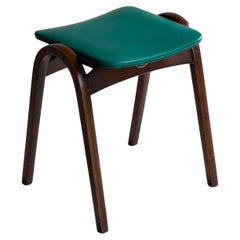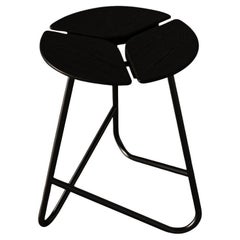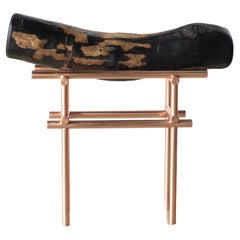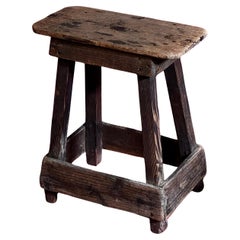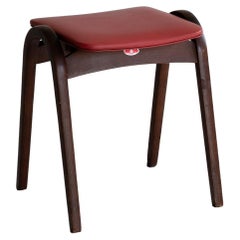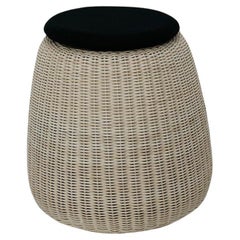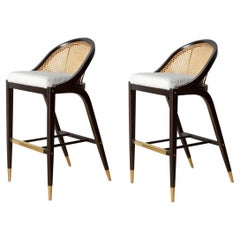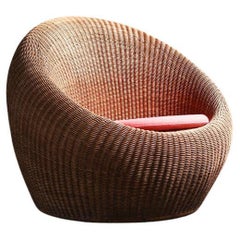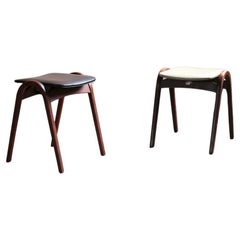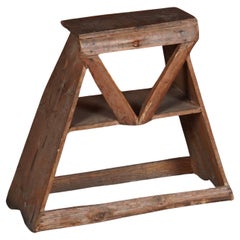Japonisme Stools
In the late 19th and early 20th century, France developed an enduring passion for Japanese aesthetics and craftsmanship. Not only did this interpretation of Japanese culture — which became known as Japonisme — infuse fresh energy into French art and design, but it also radically transformed how Europeans, and subsequently the world, would come to understand visual culture.
Until 1853, Japan had been closely guarded against foreign visitors for over two centuries. However, American Commodore Matthew C. Perry sailed into Japan that year and initiated the first of its treaties with the United States and Europe, thereby opening its borders and giving the West its first-ever look at Japanese design.
For the next few decades, taken with Japonisme, sophisticated collectors in Paris, New York and elsewhere gorged themselves on lacquered screens, celadon ceramics and netsuke ornaments, along with artworks depicting various aspects of Japanese life. The East Asian country’s influence on Europe, particularly France, contributed to one of the most creatively prosperous periods in history, leaving an imprint on the Impressionist, Art Nouveau and Art Deco movements, and inspiring artists like Edgar Degas, Mary Cassatt, Vincent van Gogh as well as luxury houses such as Louis Vuitton and Hermès. Japonisme emerged at the time when the ornate Renaissance Revival style was the most prominent mode of decorating in Europe, and Japanese aesthetics seemed strikingly modern and elegant in comparison.
In addition to everyday practical objects from Japan, such as vases, tableware and decorative boxes, Japanese art, especially Japanese woodblock prints by masters of the ukiyo-e school, caught the eye of many artists — particularly those in the Art Nouveau poster community in 1880s Paris. The luscious organic colors associated with traditional Japanese design, motifs like cherry blossoms and carp and the vivid patterns found in woodblock prints, silks and more were adopted and appropriated by painters as well as ceramicists and those working in other fields of the decorative arts. Today, demand for Japanese lacquerware — furniture, trays, writing boxes, screens, incense burners — from the Edo period (1615–1868) and the late 19th century continues to be very strong among collectors.
Find a collection of antique Japonisme furniture and decorative objects on 1stDibs.
Mid-20th Century Japanese Japonisme Stools
Wood
2010s Turkish Japonisme Stools
Stainless Steel
2010s Japanese Japonisme Stools
Copper
19th Century Japanese Antique Japonisme Stools
Pine
Mid-20th Century Japanese Japonisme Stools
Wood
1960s Japanese Vintage Japonisme Stools
Rattan
21st Century and Contemporary Turkish Japonisme Stools
Oak
2010s Turkish Japonisme Stools
Stainless Steel
2010s Turkish Japonisme Stools
Stainless Steel
2010s Turkish Japonisme Stools
Stainless Steel
2010s Turkish Japonisme Stools
Stainless Steel
20th Century Japanese Japonisme Stools
Wood, Lacquer
2010s European Japonisme Stools
Brass
1960s Japanese Vintage Japonisme Stools
Rattan
2010s Japonisme Stools
Metal
2010s American Japonisme Stools
Bouclé
Early 2000s Japanese Japonisme Stools
Rosewood
Mid-20th Century Swedish Japonisme Stools
Pine
2010s Argentine Japonisme Stools
Fabric, Wood
2010s Danish Japonisme Stools
Aluminum
Early 2000s American Japonisme Stools
Chrome
1960s Japanese Vintage Japonisme Stools
Wicker, Rattan
Early 2000s Japanese Japonisme Stools
Rosewood
1950s Swedish Vintage Japonisme Stools
Linen, Pine
Mid-20th Century Japanese Japonisme Stools
Wood
Early 1900s Japanese Antique Japonisme Stools
Wood
Early 1900s Japanese Antique Japonisme Stools
Wood
1920s Japanese Vintage Japonisme Stools
Wood
2010s Japanese Japonisme Stools
Wood
2010s Japanese Japonisme Stools
Wood
21st Century and Contemporary French Japonisme Stools
Leather, Ebony
1970s Japanese Vintage Japonisme Stools
Beech
1970s Japanese Vintage Japonisme Stools
Beech
